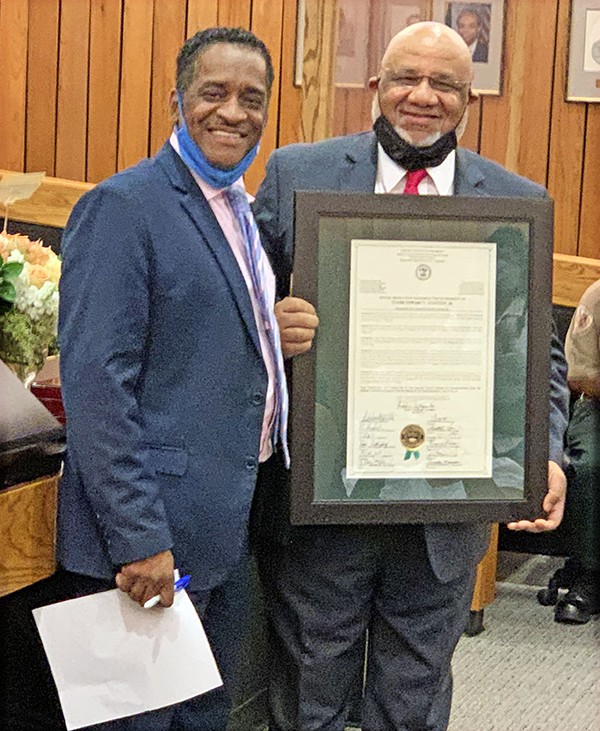Monday was a day of transition for the Shelby County Commission, beginning with a ceremony acknowledging the retirement of longtime County Clerk Ed Stanton Jr. and continuing with the formal transfer of the commission chairmanship from Republican Mark Billingsley to Democrat Eddie Jones.
The changeover was a confirmation of what seems now a restored habit of alternating partisan identities at the chairmanship level, after recent years during which various upheavals disrupted that gentleman’s agreement. The major agenda matter that followed — the disposition of three items regarding possible curtailment of Shelby County Sheriff’s Department prerogatives — reflected the determination of the commission’s members to agree to disagree more or less amicably.
Not that the items, all ordinances, received any real disposition. All got the first of three readings, and only the votes — and attitudes — reflected on the third and final vote will count. The votes on the three ordinances were each scattered in such a way as to render moot at best any predictions on an item’s final fate.
The first had to do with the issue of “excessive force” on the part of sheriff’s deputies — with the ordinance worded so as to pin down that transgression and ensure that anyone guilty of it would be suitably branded in the archives of Peace Officer Standards and Training (POST) certification maintained by the state.
Sheriff Floyd Bonner argued that his department was already seeing to that end with its problem deputies and cited numbers — 28 deputies decertified and 26 pending — to prove it.
Commissioner Tami Sawyer, the prime mover of the law-enforcement reform measures, vented her displeasure at some of the more egregious examples of deputy misconduct, as well as at the indignities she had endured as a focal figure in the struggle for reform. She and the sheriff agreed to have more direct conversations about the problem. Commissioner Mick Wright availed himself of the opportunity to apply the term “excessive force” to some of the recent mandates of local government — including the required wearing of masks during the current coronavirus pandemic. The principle, he said, was “How much power should the government have over you?”
The vote on that measure was four ayes, three nays, and four abstaining.
A similar ambivalence was the fate of the second ordinance, which had to do with proscribing the acquisition or use of military equipment by the sheriff’s department. Bonner agreed with the aim of the ordinance and made what seemed a convincing argument that his department didn’t want any such equipment and didn’t use any. Vote: 5-4-3.
The third ordinance would prohibit the “excessive” use of chemical agents (Bonner said, “We don’t use tear gas,” and that such milder chemicals as the department did use were necessary substitutes for “hands-on” action in emergency situations). A second and less controversial thrust of the ordinance was to ban “fraternization with inmates.” Vote on this one was three ayes, five noes, and two abstentions. Clearly, the ultimate fate of all three ordinances is in the balance.
• One of the more well-regarded political figures in recent Shelby County history was Curtis Person Jr., the long-term state senator and subsequent Juvenile Court Judge, whose funeral last Wednesday at Memorial Park drew a large and politically diverse crowd of mourners. Person had served in the legislature as both a Democrat and a Republican and was a pivotal figure in negotiations between the parties. Last week’s service was one of the first such observances, during this time of the pandemic, to take place not virtually but in real space, though all the mask and social distancing safeguards were upheld.
……
 Jackson Baker
Jackson Baker
County Clerk Ed Stanton Jr. (right) was honored by the Shelby County Commission Monday as he entered retirement after a county government career that began in 1972. Commissioner Eddie Jones, enjoying a milestone of his own on his first day as chairman of the county commission, did the honors.